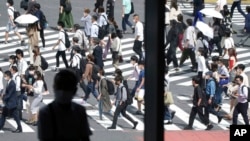Finance ministers from the Group of 20 economies Wednesday pledged to keep economic stimulus policies in place to ensure a recovery from the COVID-19 pandemic.
Amid ongoing risks, "We will continue to sustain the recovery, avoiding any premature withdrawal of support measures," according to the official communique released after the G-20 meeting.
While the global recovery has been solid, the statement notes that it has been "highly divergent" among countries.
"We reaffirm our resolve to use all available tools for as long as required to address the adverse consequences of COVID-19, in particular on those most impacted," the statement continued.
At the same time, officials are closely watching rising prices, the statement said.
The meeting of finance ministers and central bank governors is being held at a time when suppliers are struggling to meet renewed demand and bottlenecks are causing shortages of key materials and pushing prices higher.
Oil prices, notably, have spiked above $80 a barrel for the first time in years.
The World Bank estimates 8.5% of global container shipping is stalled in or around ports, twice as much as in January.
Italy's central bank chief Ignazio Visco agreed with the International Monetary Fund and others who have said the inflation pressures are mostly the result of transitory factors like the surge in demand.
But he acknowledged that "these may take months before fading away."
G-20 central bankers are studying the issue to see if there are "more structural factors at work" in the bigger-than-expected inflation spike, and "whether there is some component which starts being transitory but that could become permanent," Visco told reporters.
Central bankers are walking a fine line between supporting the recovery with easy financial conditions while warding off a permanent increase in inflation.
"Supply chain issues are being felt globally — and finance leaders from around the globe must collaborate to address our shared challenges," said U.K. Chancellor of the Exchequer Rishi Sunak, who chaired the meeting of the world's richest nations.
The G-20 communique said central banks "will act as needed" to address price stability "while looking through inflation pressures where they are transitory."
But World Bank President David Malpass warned that some of the price spikes "will not be transitory."
"It will take time and cooperation of policymakers across the world to sort them out."
IMF chief Kristalina Georgieva said the lag in vaccination rates to contain the pandemic in developing nations is contributing to the supply constraints, and "as long as it widens, this risk of interruptions in global supply chains is going to be higher."




